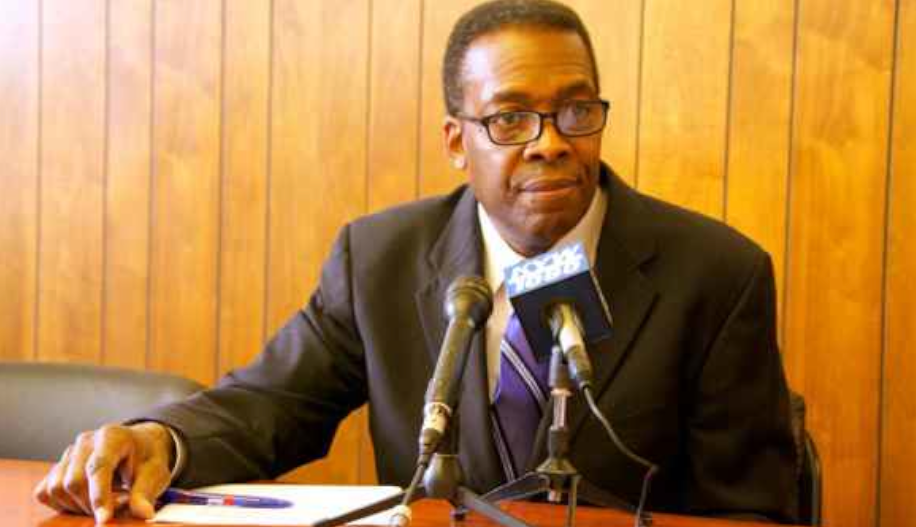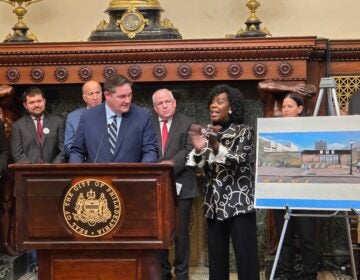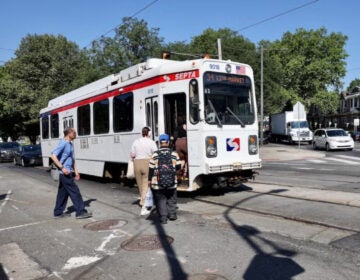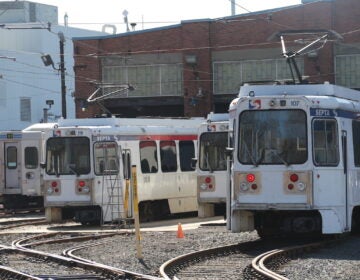Clarke Park: Council President wants builders to make more space for cars

In the last City Council session before summer recess, City Council President Darrell Clarke introduced a bill that might reopen the battle over parking in Philadelphia.
The proposed legislation would double the number of parking spaces required in many zoning categories that allow multi-family buildings from three spaces per ten units to six spaces per ten units.
“Every time I go to a community meeting in certain neighborhoods we get complaints about an inability to park,” said Clarke. “At the end of the day, there is overbuilding in some areas and that puts a significant burden on street parking and on existing residents.”
Clarke did not consult with Planning Commission staff on the bill.
“In all honesty, I’ve been around longer than most people over there,” said Clarke, when asked if the Planning Commission helped write the bill. “I hope they’ll engage [by providing hearing testimony in the fall]. But they are also—I hate to use word ‘problem,’ but they are a part of the problem by not reining in some of this overbuilding in these communities.”
The bill is the latest effort by some City Council members to reverse the lower mandatory parking minimums incorporated into the city’s new zoning code in 2012. Before then, most projects outside downtown required a one-to-one ratio of parking spots to new residential units built. The 2012 zoning code greatly reduced parking minimums. Since then, most multi-family developments only require three parking spaces for every ten units and, in some zoning categories, no new parking is required at all.
Clarke’s bill would double the parking requirements in the densest zoning categories in the Philadelphia code, in the only industrial zoning category that allows residential units, and in many of the categories that allow mid-rise development (both in categories covering Center City and in the garden apartment districts of the Northeast and Northwest sections of the city).
The bill would also require any multi-family development along commercial corridors—business-oriented streets in the neighborhoods outside Center City like East Passyunk Avenue and Frankford Avenue in Fishtown—that uses the green roof density bonus or the fresh food market bonus to provide six spaces per ten housing units.
In addition to this legislation, this autumn, Clarke hopes to hold a series of hearings on solutions to the parking problem, focusing on this bill and another that would increase fines for overstaying time limits in permit parking districts.
Asked for comment on the bill, Mayor Jim Kenney’s administration simply said that they will be reviewing it.
But many planning experts believe that higher mandatory parking minimums increase the cost of housing and incentivize additional car usage in areas where plentiful transportation alternatives exist.
“This is not a particularly productive bill,” says Michael Fichman, city planner and researcher at the University of Pennsylvania’s PennPraxis*. “There is a cycle that occurs when you mandate more parking. By inviting more automobiles into the urban environment, you create congestion and a demand for still more parking. And then residential and commercial buildings pass the costs of required parking onto customers and tenants.”
Housing developers were also confused by the new bill. Although concentrating focus on on an inclusionary housing bill introduced by 7th District Councilmember Maria Quiñones-Sanchez, development interest groups worried Clarke’s bill would drive up the cost of housing.
“Doubling the parking requirement will cripple a lot of projects in CMX-4 and CMX-5,” said Brian Emmons, president of the Building Industry Association (BIA), in reference to the city’s two densest zoning categories. “Often due to site specific restraints, there’s only one way to go and that’s down. But underground parking is already very expensive to build. In a lot of these larger projects, the cost of each [underground] parking space could be $80,000 to $100,000.”
Many of the spaces required by the current, lower minimum already sit empty, developers told PlanPhilly.
The bill also faces opposition from the Philadelphia Association of Community Development Corporations.
“Increasing parking requirements requires deeper subsidies for affordable housing,” says Beth McConnell, the policy director for PACDC. “It would mean fewer units being built at a time when there aren’t even close to enough resources to meet current demand for affordable homes. This would make it even harder.”
The BIA’s Emmons agrees with Clarke that there is a parking problem in Philadelphia, but says the real issue is the acculturated norm of free on-street parking. For decades, as the city’s population fell and there were few new residential developments, many residents grew accustomed to parking for free, right in front of their homes.
Now that the city is growing again, free on-street parking—or the Parking Authority’s extraordinarily cheap permitted parking—is leading to intense scarcity of spots in some neighborhoods.
Gilles Duranton, chair of the real estate department at the University of Pennsylvania’s Wharton School, agrees that free or incredibly cheap on-street parking is the crux of the problem. As long as the existing parking prices (or lack thereof) remain in place, parked cars can occupy highly valuable public land without paying for it. As neighborhoods fill again with Philadelphians who’d also like to use use that land for cheap or free, parking conflicts sharpen.
“The root of the problem is that the city is massively subsidizing on-street parking,” said Duranton. “Unless we change that, parking minimums make sense. In poorer neighborhoods, you have council people representing poorer constituents who want new developments for richer people to actually pay for their own parking as opposed to clogging the streets with more cars.”
Duranton said that while Clarke’s bill to hike parking requirements may make sense under current conditions, a better option would be increasing the amount of permitted parking in the city and the price of that permitted parking. Parking permits are only $35 a year for a one car and only go up to $100 per car for a four-car household. If people actually had to pay something close to the value of the parking spaces they occupied, Duaranton said, there would be less overcrowding.
But in the city that once pelted Mayor Richardson Dilworth with stones over the mere idea of paying for parking permits in South Philly, Duranton understands why politicians haven’t tried to address the true cost of on-street parking.
“If the city was to charge a couple thousand a year for on-street parking, reflecting its real value, people would riot,” says Duranton. He suggests instead phasing in increases of about $25 annually over the course of ten or more years.
Fichman of PennPraxis says there is another way, promoted by nationally renowned parking expert Donald Shoup: implement technology that would allow the cost of parking to fluctuate with current demand, going up as spots fill up and down as they empty out.
Neither idea sits well with Clarke.
“I don’t think it’s fair to punish the people who already live there because people who come in from elsewhere drive in and take parking spaces on the block,” said Clarke, when asked about Duranton and Fichman’s suggestions.
“There isn’t an easy solution,” said Clarke. “That’s why I want to have a broader discussion [in the fall] and come up with a real comprehensive plan.”
*Until moving to WHYY in 2015, PlanPhilly was a project of PennPraxis at PennDesign.
WHYY is your source for fact-based, in-depth journalism and information. As a nonprofit organization, we rely on financial support from readers like you. Please give today.







